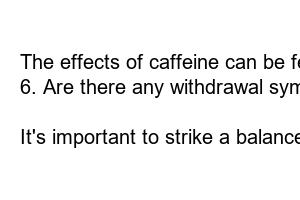하루 카페인 권장량
Title: Recommended Amount of Caffeine Per Day: Balancing Energy and Well-being
Introduction:
Caffeine, the most widely consumed psychoactive substance worldwide, is cherished for its energizing properties. However, it is vital to consume caffeine in moderation to avoid experiencing negative effects on our health and well-being. In this article, we will explore the recommended amount of caffeine per day to help you strike the right balance between enjoying your favorite beverages and maintaining a healthy lifestyle.
1. Understanding Caffeine:
Caffeine is a natural stimulant found in coffee beans, tea leaves, cacao, and certain plants. When consumed, it enters our bloodstream and affects the central nervous system, providing an energy boost and enhancing alertness. However, excessive caffeine intake can lead to problems such as restlessness, anxiety, and disturbed sleep patterns.
2. Daily Caffeine Recommendations:
According to health experts, **the recommended daily caffeine intake for adults** should be limited to around 400 milligrams, equivalent to approximately four cups of brewed coffee or ten cups of tea. For pregnant women, it is advisable to reduce caffeine consumption to 200 milligrams per day.
3. Factors Influencing Caffeine Sensitivity:
Individuals vary in their sensitivity to caffeine due to factors such as age, weight, metabolism, and overall health. Some people may experience the desired effects of caffeine with smaller amounts, while others may require more to achieve the same results. It is important to know your own caffeine sensitivity and adjust accordingly.
4. Hidden Sources of Caffeine:
Caffeine isn’t limited to just coffee and tea. Surprisingly, it can also be found in various foods, medications, and even beauty products. Always check labels to ensure you are aware of the caffeine content present in these products, as it can contribute to your daily caffeine intake unknowingly.
5. Moderation and Timing:
**Limiting your caffeine intake** is key to managing its potential side effects. Spacing out your caffeine consumption throughout the day is highly recommended. Additionally, it’s advisable to avoid consuming caffeine within six hours of your bedtime to maintain a healthy sleep routine.
6. Alternatives to Caffeine:
If you’re looking for alternatives to reduce your caffeine intake, consider opting for herbal teas, decaffeinated coffee, or naturally caffeine-free beverages like herbal infusions. These options will still provide a comforting and enjoyable experience without the caffeine jitters.
FAQs:
1. Does caffeine have any health benefits?
Caffeine, in moderation, can improve cognitive function, support physical performance, and even provide protection against certain diseases like Parkinson’s and liver disease.
2. Can caffeine be addictive?
Caffeine can be habit-forming, but it is not considered addictive in the same sense as drugs or alcohol.
3. Is it safe to consume caffeine during pregnancy?
While moderate caffeine intake during pregnancy is generally deemed safe, it is advisable to limit consumption to 200 milligrams per day to minimize potential risks.
4. Can caffeine affect sleep patterns?
Yes, excessive caffeine consumption, especially in the evening, can disturb sleep patterns and lead to difficulties falling asleep or maintaining a deep sleep.
5. How long does caffeine stay in the system?
The effects of caffeine can be felt within 15-45 minutes and can persist for several hours, depending on individual factors like metabolism and sensitivity.
6. Are there any withdrawal symptoms associated with caffeine?
Withdrawal symptoms such as fatigue, headaches, and irritability may occur when someone abruptly cuts back on their caffeine intake after prolonged heavy consumption. Gradually reducing caffeine intake can help minimize these symptoms.
Summary:
It’s important to strike a balance when consuming caffeine. Experts recommend a daily intake of approximately 400 milligrams for adults, but this can vary based on individual factors. Monitoring caffeine sources, moderating intake, and exploring alternatives allow us to enjoy the benefits of caffeine without compromising our well-being.

